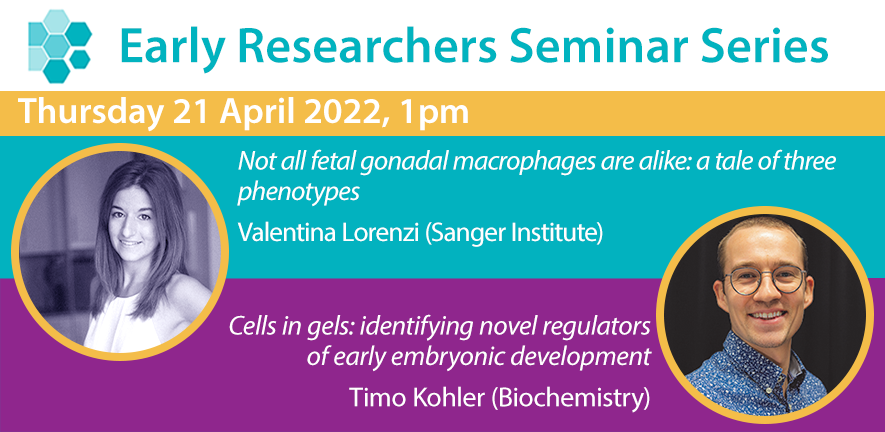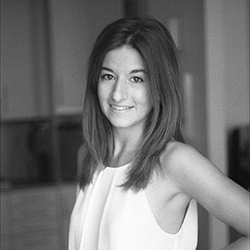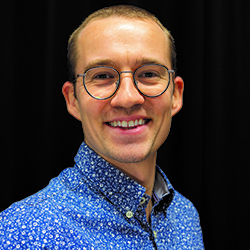
Thursday 21 April 2022, 1pm - 2pm
Not all fetal gonadal macrophages are alike: a tale of three phenotypes
Valentina Lorenzi (Wellcome Sanger Institute)
Cells in gels: identifying novel regulators of early embryonic development
Timo Kohler (Biochemistry)
Chair: Caterina Milo (Law)
Meeting link
Please register on Eventbrite to receive the Zoom meeting details (they will be available a couple of days before the seminar).
Speakers and abstracts
Not all fetal gonadal macrophages are alike: a tale of three phenotypes
Valentina Lorenzi (Wellcome Sanger Institute)
Gonadal development is a complex process that involves sex determination followed by divergent maturation into either testes or ovaries. Tissue-resident immune cells are thought to play an important role in gonadal development and function, with testicular macrophages having recently gained momentum for their putative role in male fertility. In this study, we set out to investigate the immune composition of the human fetal gonads using single-cell transcriptomics and multiplexed single-molecule fluorescence in situ hybridisation. Our analysis revealed that most gonadal immune cells in the first and second trimester of gestation are macrophages with a tissue-repair phenotype, previously defined in other developing organs. Unique to the developing testes, we find two rare macrophage populations with an osteoclast-like and microglia-like signature, respectively, for which we propose putative functions based on their spatial location within the tissue architecture and their predicted interactions with neighbouring cells.
Valentina Lorenzi is a first-year PhD student in bioinformatics co-supervised by John Marioni (EMBL-EBI) and Roser Vento-Tormo (Wellcome Sanger Institute). Her research focuses on understanding the development of the reproductive system in humans using single-cell genomics technologies as well as spatial assays, with a particular interest in the molecular mechanisms underlying sex differentiation.
Cells in gels: identifying novel regulators of early embryonic development
Timo Kohler (Biochemistry)
Biomechanical cues are instrumental in guiding embryonic development and cell differentiation. Understanding how these physical stimuli translate into transcriptional programs could provide insight into mechanisms underlying mammalian pre-implantation development. Here, we explore this by exerting microenvironmental control over mouse embryonic stem cells (ESCs). Microfluidic encapsulation of ESCs in agarose microgels stabilized the naïve pluripotency network and specifically induced expression of Plakoglobin (Jup), a vertebrate homologue of β-catenin. Indeed, overexpression of Plakoglobin was sufficient to fully re-establish the naïve pluripotency gene regulatory network under metastable pluripotency conditions, as confirmed by single-cell transcriptome profiling. Finally, we found that in the epiblast, Plakoglobin was exclusively expressed at the blastocyst stage in human and mouse embryos – further strengthening the link between Plakoglobin and naïve pluripotency in vivo. Our work reveals Plakoglobin as a mechanosensitive regulator of naïve pluripotency and provides a paradigm to interrogate the effects of volumetric confinement on cell-fate transitions.
Timo Kohler trained as a biochemist during his undergraduate and master studies. Subsequently, he specialised in stem cell biology and early embryonic development during his PhD at the University of Cambridge. His work is focussed on how pluripotency – a cell’s ability to differentiate into any cell of the body – is established, maintained and executed.
The Early Researchers Seminar Series (ERSS) is a platform for PhD Students and early career researchers (ECRs) at the University of Cambridge with research foci on reproduction to share and discuss their research with other academics from a range of disciplines also researching reproduction at the University. Seminars are held on Zoom on the third Thursday of every month, 1pm - 2pm. For more information, and for the full 2021 - 2022 programme, please see the main ERSS page.



